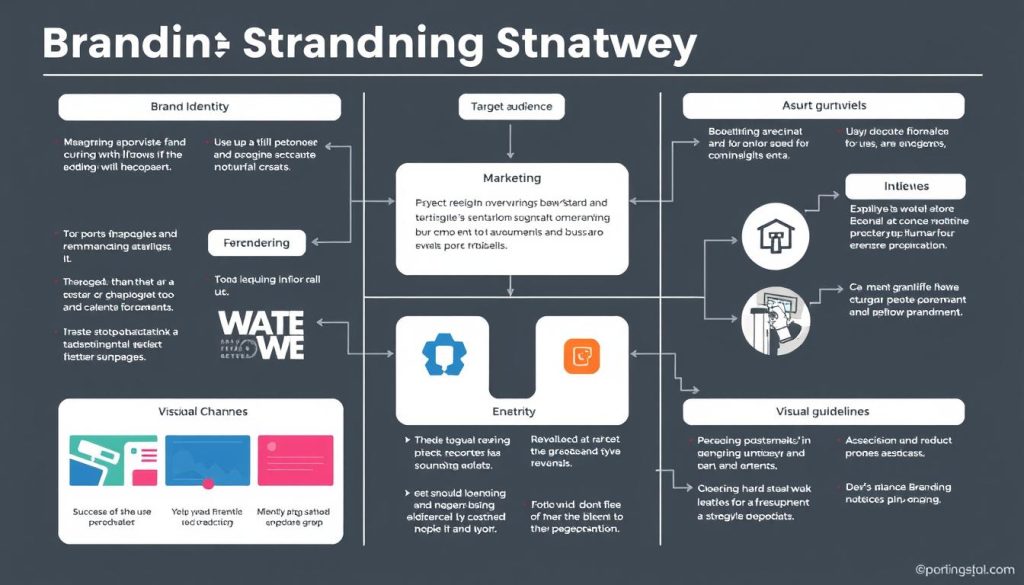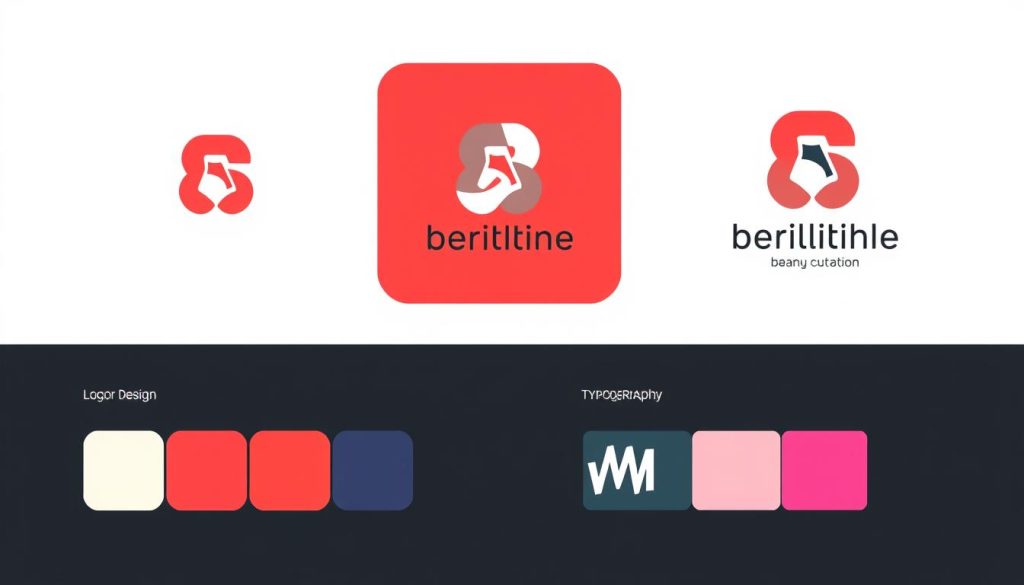As an independent professional, establishing a stable and secure career can be a daunting task. In today’s competitive landscape, it’s easy to get lost in the crowd. However, having a strong brand can be the key differentiator that sets you apart from competitors and builds trust with your target audience.
A well-crafted branding strategy serves as the foundation for long-term career success, providing a framework that guides all professional decisions and client interactions. By developing and implementing an effective branding strategy, you can create a consistent professional identity that resonates with your customers and establishes your business as a trusted partner.
For freelancers, consultants, and solo practitioners looking to establish sustainable professional practices, understanding the connection between strategic branding and career security is essential.
Table of Contents
Key Takeaways
- Develop a strong brand identity that resonates with your target audience.
- Create a consistent professional image across all client interactions.
- Establish a framework for long-term career success.
- Build trust with your customers through effective branding.
- Stay ahead of the competition with a well-crafted branding strategy.
Understanding the Power of Branding for Independent Professionals
For independent professionals, a powerful brand is not just a marketing tool, but a career stabilizer. A strong brand strategy offers numerous benefits, both internally and externally, driving a consistent and cohesive identity that engages customers and employees alike.
A well-crafted brand strategy improves internal alignment and brand consistency, builds customer loyalty, differentiates you from competitors, and strengthens internal brand advocacy. When customers understand and resonate with your brand’s values, they are more likely to feel a connection. In fact, a study by Sprout Social shows that 57% of customers will spend more with a brand they feel connected to, while 76% will buy from that brand over a competitor.
The Link Between Strong Branding and Career Stability
A strong brand is essential for independent professionals seeking career stability. By establishing a unique and valuable identity, you can create recognition and trust in a crowded marketplace. This, in turn, leads to increased customer loyalty and a stable income stream.
- For independent professionals, a strong brand strategy creates recognition and trust.
- When clients can easily identify what makes your services unique and valuable, they’re more likely to remain loyal.
- Understanding the elements of strong branding helps independent professionals create sustainable careers.
How Effective Branding Creates Security in an Independent Career
Effective branding creates security by establishing you as an authority in your field, allowing you to command premium rates and attract higher-quality clients. Your brand strategy serves as a roadmap that guides all business decisions, from which clients to pursue to how you’ll position your services in the market.
By communicating your unique value proposition consistently, you build a reputation that serves as a safety net during economic downturns or market shifts. This enables you to maintain a stable career, even in uncertain times.
Defining Your Professional Brand Purpose

Your professional brand purpose serves as the foundation for your entire branding strategy, defining why you do what you do. It answers the fundamental question, « Why does my brand exist? » and provides a motivating stand that helps you navigate through challenges.
Crafting Your Mission and Vision Statements
Crafting clear mission and vision statements is essential for independent professionals to stay focused on their core objectives and communicate their purpose to potential clients. Your mission statement should concisely express what you currently do and the value you provide, while your vision statement outlines your aspirations and long-term impact.
- Define your customer and understand their needs to craft a relevant mission statement.
- Clearly articulate your values to ensure they align with your mission and vision.
- Use your mission and vision statements to guide your decisions and actions as an independent professional.
Aligning Your Purpose with Long-Term Career Goals
Aligning your brand purpose with your long-term career goals ensures consistency in your professional development and helps you make strategic decisions about which opportunities to pursue. Your brand purpose should resonate with your personal values while also appealing to the values of your ideal clients.
To achieve this alignment, consider how your professional services solve specific problems or fulfill particular needs for your clients. A well-defined purpose differentiates you from competitors who may offer similar services but lack a compelling « why » behind their work.
By defining your professional brand purpose, crafting clear mission and vision statements, and aligning your purpose with your long-term career goals, you can establish a strong foundation for your branding strategy and achieve stability and security in your independent career.
Identifying Your Ideal Client Profile
The foundation of a successful independent practice lies in identifying and understanding your ideal client profile. This understanding allows you to tailor your services to meet the specific needs of your target audience, thereby building a strong and loyal client base.
To achieve this, you need to conduct thorough research to understand the pain points, preferences, and behaviors of your potential clients. This involves analyzing feedback from various sources such as social media comments, customer reviews, and sales notes to identify common challenges faced by your customers.
Researching and Defining Your Target Audience
Researching your target audience is a critical step in developing an effective brand strategy. It involves gathering demographic information, understanding their interests, and analyzing their behaviors to create a detailed profile of your ideal customer. By doing so, you can tailor your marketing efforts to resonate with your target market, enhancing the overall effectiveness of your brand strategy.
- Gather data from various sources including social media, customer reviews, and sales interactions.
- Analyze the collected data to identify patterns and common characteristics among your customers.
- Use this information to create a comprehensive profile of your ideal client.
Creating Detailed Client Personas for Your Independent Practice
Creating detailed client personas is an essential step in transforming abstract market data into realistic representations of the people you serve. Your client personas should include demographic information, professional challenges, goals, decision-making factors, and communication preferences. Understanding where your ideal clients spend their time, both online and offline, helps you determine the most effective channels for reaching them.
By clearly defining who you serve best, you can more easily identify and decline projects that don’t align with your expertise or business goals, saving time and resources. Regular refinement of your client profiles based on actual client interactions ensures your targeting remains accurate as market needs evolve.
Developing a Comprehensive Branding Strategy Framework

A comprehensive branding strategy framework is essential for independent professionals to differentiate themselves and achieve their business goals. This framework serves as a structured approach to developing and implementing a professional brand that resonates with the target audience.
Setting SMART Objectives for Your Brand
Setting SMART objectives (Specific, Measurable, Achievable, Relevant, Time-bound) for your brand ensures you have clear targets to work toward and metrics to evaluate your progress. Your branding objectives should align with your overall business goals, whether that’s increasing client retention, commanding higher rates, or expanding into new service areas.
For instance, a SMART objective could be to increase your online presence by boosting your website traffic by 20% within the next 6 months. This objective is specific, measurable, achievable, relevant, and time-bound, providing a clear direction for your branding efforts.
Creating a Roadmap for Implementation
Creating a detailed roadmap for implementation breaks down the branding process into manageable steps with specific timelines and responsibilities. This roadmap should include strategies for both online and offline presence, ensuring consistency across all professional touchpoints.
Your branding framework should be flexible enough to adapt to changing market conditions while maintaining core brand elements. It should outline not only initial brand development but also ongoing brand management and evolution processes to ensure long-term relevance.
To learn more about strategies for success, visit our blog post on strategies de réussite.
Crafting Your Unique Brand Positioning

A well-defined brand positioning serves as the foundation upon which independent professionals can build a successful and sustainable career. It involves creating a unique identity that differentiates you from competitors and resonates with your target audience.
To craft your unique brand positioning, you must first understand the competitive landscape and identify gaps in the market that your skills and approach can fill. This process not only helps in differentiating your services but also in establishing a niche where you can excel.
Differentiating Yourself from Competitors
Differentiating yourself from competitors is crucial in a crowded market. It involves analyzing what sets you apart and leveraging those unique attributes to attract clients who are looking for something more than just a commodity service. Your differentiation strategy should be based on your strengths, the value you bring to clients, and your passion for your work.
- Identify your unique strengths and the specific benefits you offer to clients.
- Analyze your competitors to understand their positioning and identify gaps.
- Develop a niche or specialize in a particular area to stand out.
Defining Your Unique Value Proposition as an Independent Professional
Your unique value proposition (UVP) is a clear statement that communicates the unique benefits you offer to your clients. It’s what sets you apart from others in your field and makes you the go-to professional for your target audience. To define your UVP, you need to understand your clients’ needs, preferences, and pain points, and then articulate how you address them in a way that others cannot.
By focusing on your brand positioning and clearly defining your UVP, you can develop a strategy that not only attracts the right clients but also justifies your value proposition, leading to a more stable and secure business.
Building Your Professional Brand Identity

Crafting a compelling brand identity is essential for independent professionals to convey their unique value proposition effectively. Your professional brand identity encompasses all visual elements that represent you in the marketplace, creating immediate recognition and conveying your brand personality.
Visual Elements: Logo, Colors, and Typography
A well-designed logo serves as the cornerstone of your visual identity, providing a memorable symbol that clients associate with your services and quality standards. Strategic color selection goes beyond aesthetics—colors evoke specific emotions and associations that should align with your brand positioning and the expectations of your target audience.
Typography choices reflect your brand personality, with font styles communicating professionalism, creativity, tradition, or innovation through their visual characteristics. The combination of these visual elements—logo, colors, and typography—forms the foundation of your brand’s visual identity.
Creating Brand Guidelines for Consistency
Creating comprehensive brand guidelines ensures consistency across all touchpoints, from your website and social media to business cards and presentation templates. For independent professionals, consistency in visual identity builds trust and recognition, particularly important when competing against larger organizations with bigger marketing budgets.
Your brand guidelines should include specifications for logo usage, color codes, typography hierarchy, image styles, and layout principles to maintain visual coherence. Digital assets like email signatures, social media profile images, and website elements should all adhere to the same visual system to reinforce your professional identity.
Establishing Your Brand Voice and Messaging
Establishing a strong brand voice is crucial for independent professionals seeking to build lasting connections with their clients. Your brand voice is the distinctive way you communicate with clients and prospects, reflecting your personality and values while maintaining professional credibility.
Developing a Consistent Communication Style
Developing a consistent communication style helps independent professionals build recognition and trust, as clients know what to expect in every interaction. Your brand voice should align with your positioning and appeal to your target audience—whether that’s authoritative and technical or warm and approachable. To achieve consistency, consider the following elements:
- Defining your tone and language
- Using consistent terminology across all channels
- Ensuring that all messaging aligns with your brand’s core values
Consistency in your brand voice is key to establishing a strong brand identity. It helps in creating a cohesive brand experience across all touchpoints, from your website to social media and client presentations.
Crafting Your Brand Story and Key Messages
Crafting a compelling brand story helps potential clients understand your professional journey, motivations, and the unique perspective you bring to your work. Effective brand messaging distills complex services into clear, benefit-focused statements that resonate with client needs and differentiate you from competitors.
| Brand Story Elements | Description | Example |
|---|---|---|
| Professional Journey | Highlights your experience and expertise | « With over a decade of experience in digital marketing… » |
| Motivations | Explains why you do what you do | « Driven by a passion for helping businesses grow online. » |
| Unique Perspective | Showcases your unique approach or methodology | « Using data-driven insights to craft personalized marketing strategies. » |
Authenticity in your brand voice and messaging is particularly important for independent professionals, as clients often choose to work with individuals they feel they can trust and relate to. Your brand story should highlight pivotal experiences that shaped your expertise and approach, creating emotional connections with potential clients.
Defining and Communicating Your Professional Values
Your professional values are the foundation upon which your independent practice is built. These values serve as guiding principles that influence your decisions and actions, ultimately shaping your brand identity and client interactions.
To establish a strong brand, it’s crucial to identify and communicate your core values effectively. This involves a thoughtful process of reflection on what matters most to you as a professional.
Core Values That Drive Your Practice
Identifying your core values is the first step towards integrating them into your professional brand. These values should authentically represent your ethical and philosophical stance, influencing every aspect of your practice.
- Authenticity: Ensuring that your actions and decisions align with your stated values.
- Integrity: Maintaining consistency between your values and the services you offer.
- Client-centric approach: Focusing on delivering value to your clients in a manner that respects their needs and priorities.
Incorporating Values into Client Experience
Incorporating your professional values into the client experience is vital for creating a consistent and authentic brand image. This can be achieved by:
- Embedding your values into every touchpoint, from initial client contact to the delivery of services.
- Ensuring that your team understands and aligns with your core values.
- Using your values as a filter to determine the types of projects and clients you engage with.
By clearly defining and communicating your professional values, you can differentiate your brand, attract like-minded clients, and build a strong reputation in your industry.
Implementing Your Branding Strategy Across Channels

Independent professionals can bolster their market standing by deploying a comprehensive branding strategy across different channels. This approach not only enhances visibility but also fosters recognition and trust among potential clients.
Creating a Cohesive Online Presence
A cohesive online presence is foundational to a successful branding strategy. Your website serves as the central hub of your online identity, where your brand’s messaging, values, and visual elements should be comprehensively expressed. To achieve this, consider the following best practices:
- Use a brand portal to maintain consistency across all platforms.
- Create content calendars to organize and schedule your content effectively.
- Follow brand guidelines to ensure uniformity in visual elements and tone of voice.
- Regularly review and update your content to keep it fresh and relevant.
- Tailor your content to fit the unique requirements of each channel, such as using SEO-focused content for blogs and engaging visuals for social media.
For more insights on finding clients online, visit our blog post on how to find clients online.
Extending Your Brand to Offline Touchpoints
While your online presence is crucial, it’s equally important to extend your brand strategy to offline touchpoints. This includes business cards, presentation materials, and in-person networking events. Consistency in visual elements and tone of voice across these touchpoints reinforces your brand identity and messaging.
To maintain consistency, consider creating templates for your offline materials and establishing systems for regular brand implementation. This will help you maintain a strong brand presence despite limited time and resources.
Measuring the Success of Your Branding Efforts
Measuring the success of your branding strategy is essential for independent professionals to ensure their efforts are yielding the desired stability and security. To achieve this, it’s crucial to track key performance indicators (KPIs) that reflect the effectiveness of your branding initiatives.
Key Performance Indicators for Independent Professionals
For independent professionals, several KPIs are particularly relevant:
- Client acquisition rates and referral sources
- Engagement metrics, such as social media interactions and email open rates
- Conversion rates from consultations to clients
- Premium pricing ability compared to competitors
- Client retention rates and repeat business percentages
These indicators provide insights into how effectively your brand is attracting and retaining your ideal clients.
Tools and Methods for Brand Performance Tracking
To monitor these KPIs, independent professionals can utilize various tools and methods:
- Client surveys and testimonial analysis to gauge satisfaction and brand perception
- Digital analytics from your website and social media platforms to measure brand awareness and engagement
- Regular competitive analysis to assess your brand’s market position
Establishing baseline measurements before implementing new branding initiatives is also crucial for accurately assessing their impact over time.
By regularly tracking these metrics and adjusting your brand strategy accordingly, you can optimize your marketing efforts and improve overall business performance. This data-driven approach enables you to make informed decisions, enhancing your brand’s effectiveness in attracting and retaining customers.
Evolving Your Brand for Long-Term Stability
To achieve long-term stability, it’s essential to regularly assess and evolve your professional brand. A strong brand strategy is not static; it must adapt to changes in the market, industry developments, and your own professional growth. This evolution ensures that your brand remains relevant and continues to effectively communicate your value to your target audience.
Refreshing Your Professional Brand
Knowing when to refresh your professional brand is crucial. Significant career milestones or shifts in service offerings often signal the need for a brand evolution. Regular brand audits, typically conducted annually or biennially, help identify elements that remain effective and those that need refreshing. These audits are an opportunity to remove outdated collateral, add new material, and organize your branding assets for consistency.
- Monitor market trends and your professional development to identify misalignments.
- Preserve the equity you’ve built while updating elements that no longer serve your positioning.
- Stay informed about industry developments, client needs, and competitor positioning.
Adapting to Market Changes
Adapting to market changes while maintaining brand equity is a delicate balance. Your brand strategy should define where decisions are rigid and where they are open to evolve. This flexibility allows your brand to grow with your business and respond to changes in the market or industry.
| Aspect | Action | Benefit |
|---|---|---|
| Brand Audits | Conduct annually or biennially | Maintains relevance and consistency |
| Market Monitoring | Stay informed about industry developments | Allows for timely adaptations |
| Brand Refresh | Update elements that no longer serve your positioning | Preserves brand equity while modernizing |
By creating a balance between consistency and flexibility in your brand strategy, you can ensure long-term stability and success as an independent professional. Regularly assessing and evolving your brand will help you stay relevant in a changing market while maintaining the recognition you’ve established.
Conclusion
By distilling the essence of your professional identity into a compelling brand narrative, you can differentiate yourself and attract the right clients. A comprehensive branding strategy is not just a marketing luxury but an essential foundation for independent professionals seeking stability and security in their careers.
Throughout this guide, we’ve explored how strategic branding creates recognition, builds trust, and differentiates you in competitive markets—all factors that contribute to a more stable independent practice. By defining your brand purpose, identifying your ideal clients, establishing a unique positioning, and creating consistent visual and verbal identity, you build a professional presence that attracts and retains the right customers.
The process of developing your brand strategy forces valuable clarity about your professional strengths, values, and goals, serving as a decision-making framework that guides your business development. For independent professionals, a strong brand creates a buffer against market fluctuations by establishing loyal client relationships and commanding premium rates that reflect your unique value.
Implementing your brand consistently across all touchpoints, measuring its effectiveness, and evolving it thoughtfully over time ensures your professional identity remains relevant and compelling. The stability and security that come from strategic branding allow independent professionals to focus on delivering exceptional work rather than constantly chasing new clients.
As you implement the strategies outlined in this guide, remember that effective branding is both an art and a science—requiring creativity and strategic thinking, but ultimately delivering measurable results for your independent practice. By building a strong brand, you can establish a lasting presence in your market and achieve long-term success.
FAQ
What is the importance of branding for independent professionals?
Branding is crucial for independent professionals as it helps establish a strong identity, build trust with clients, and differentiate themselves from competitors, ultimately leading to career stability and security.
How do I define my professional brand purpose?
Defining your professional brand purpose involves crafting your mission and vision statements, aligning them with your long-term career goals, and identifying your core values that drive your practice.
What is the significance of identifying my ideal client profile?
Identifying your ideal client profile enables you to research and define your target audience, create detailed client personas, and tailor your services to meet their specific needs, resulting in more effective marketing and client engagement.
How do I develop a comprehensive branding framework?
Developing a comprehensive branding framework involves setting SMART objectives, creating a roadmap for implementation, and establishing a consistent brand identity across all channels.
What is brand positioning, and how do I craft mine?
Brand positioning refers to the process of differentiating yourself from competitors and defining your unique value proposition. Crafting your unique brand positioning involves identifying your strengths, understanding your target audience, and creating a compelling message that resonates with them.
How do I measure the success of my branding efforts?
Measuring the success of your branding efforts involves tracking key performance indicators such as website traffic, social media engagement, and client acquisition, as well as using tools and methods to monitor brand performance and adjust your strategy accordingly.
When should I refresh my professional brand?
You should refresh your professional brand when your services or target audience have changed significantly, or when your brand identity no longer accurately reflects your values and mission. Refreshing your brand can help you stay relevant and maintain brand equity.
How can I maintain consistency in my branding across different channels?
Maintaining consistency in your branding involves creating brand guidelines, using a consistent visual identity, tone, and messaging across all channels, including your website, social media, and offline touchpoints.





